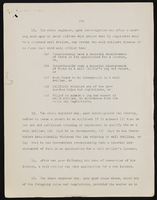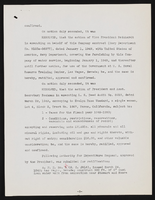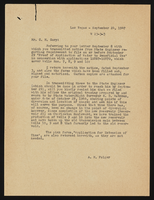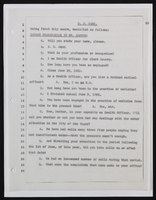Search the Special Collections and Archives Portal
Search Results
John Cannito oral history interview
Identifier
Abstract
Oral history interview with John Cannito conducted by Stefani Evans on April 03, 2018 for the Building Las Vegas Oral History Project. In this interview, Cannito discusses his early life and constantly moving to different states during his youth. He talks about his father’s employment with Amtrak, train transportation, and joining Perini Construction in Phoenix, Arizona. Cannito describes the role of an engineer in a construction company, and co-founding a software development company. Later, Cannito recalls joining The PENTA Building Group, the projects he was involved with, and becoming Chief Operating Officer. Lastly, Cannito discusses the company’s relationship with Native American-owned casinos, and the importance of maintaining long-term relationships with clients.
Archival Collection
Judy K. Cameron oral history interview
Identifier
Abstract
Oral history interview with Judy K. Cameron conducted by Evan Polili on April 19, 2004 for the Public School Principalship Oral History Project. In this interview, Cameron reflects upon her 30-year career as a teacher and administrator with the Clark County School District (CCSD) from the 1960s to the 1990s. She describes her regular job duties, challenges she faced, and training experiences that she feels were the most beneficial to her career. She also describes her experience as an assistant principal at Bonanza High School, and how the experience prepared her for principalship. She also offers her opinions of the contemporary standing of CCSD, and challenges from overcrowded classrooms.
Archival Collection

Transcript of interview with Arby Hambric by Claytee D. White, September 23, 2015
Date
Archival Collection
Description
Arby L. Hambric's book entitled, "To Thee I See: From picking in the fields of Texas to cooking for dignitaries on U.S. Navy ships, a journey I wouldn't change," describes his profound journey from working in the cotton fields as a child to being drafted into the U.S. Navy, before completing high school. During this interview, he recalls the significant achievements of the "Red Tails" and the Tuskegee Airmen. Beginning his 20 year Navy career before military integration, Arby describes the racial tensions that plagued the U.S. Navy in the 1940s, and discusses how he was able to successfully navigate that racist environment for two decades and three war eras. Arby enrolled in San Diego State College after leaving the U.S. Navy. He also worked as maintenance personnel for Sears and Roebuck and started a catering business with his wife. He became a member of the Southern Nevada Enterprise Community, SNEC Board upon moving to Las Vegas, Nevada, after his wife died. With a family legacy he can be proud of, Arby highlights the achievements of his great grandson Taquan Mizzell, a Virginia Cavaliers running back at the University of Virginia. As a Navy veteran, Arby often volunteered his time and resources to help others in need. He recalls driving the sick and elderly back and forth from the Westside community to Valley Hospital or University Medical Center, UMC. He also discusses government enforced road closures and a wall that was built to block Blacks from entering the new downtown. This interview sheds new light on military integration and offers key strategies for overcoming environmental racism. Arby mentions a documentary about the closing of the wall and offers his predictions on the future of the Westside.
Text

Interview with William Byron Beam, January 20, 2005
Date
Archival Collection
Description
Text

Interview with Elsie Lavonne Lewis, November 16, 2004
Date
Archival Collection
Description
Text




